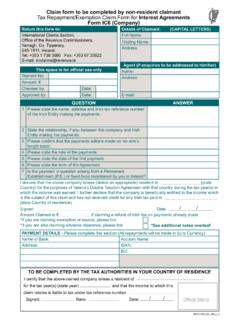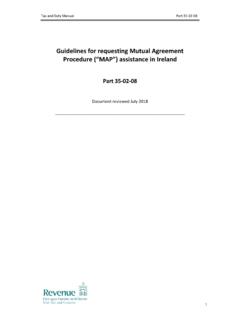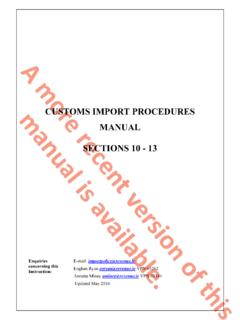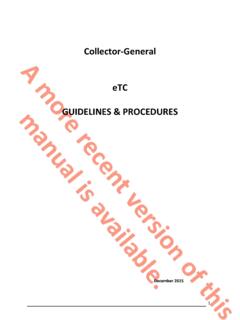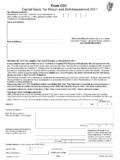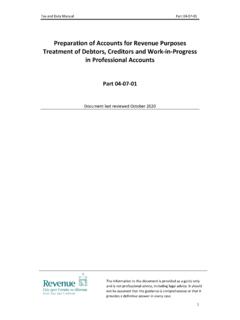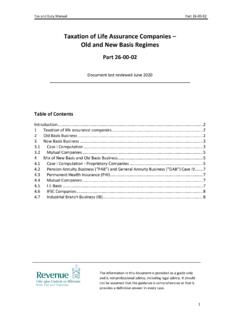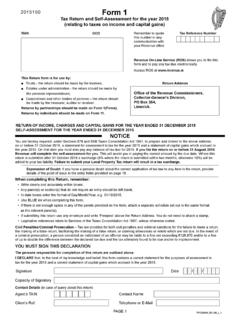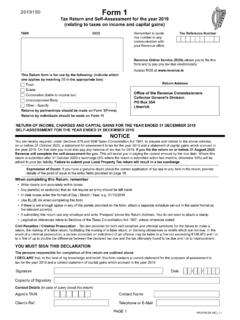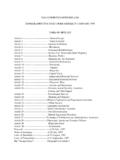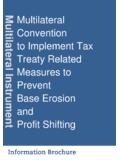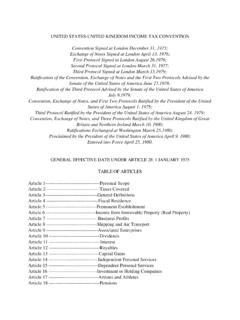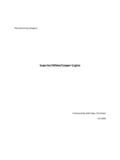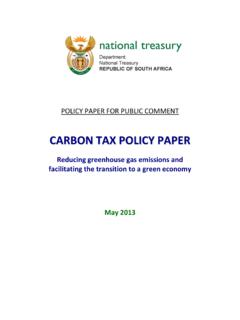Transcription of legislation contained in the Taxes Consolidation Act …
1 [ ] corporation Tax - general background [Note: the contents of this Instruction are based on legislation in force up to and including Finance Act 2015. Throughout this manual reference is made to legislation contained in the Taxes Consolidation Act 1997 (TCA)]. 1. Charge to corporation Tax: A company resident in the State is, subject to some exceptions, chargeable to corporation tax on all its profits wherever they arise. A company's profits comprise its income and chargeable gains net of allowable losses. The charge covers profits accruing for the benefit of a company under any trust or arising under any partnership and extends to profits arising in its own winding up. For corporation tax purposes the profits of a company are computed by reference to its accounting periods . An accounting period is normally the period of 12 months for which the company makes up its accounts.
2 A non-resident company is not within the charge to corporation tax unless it carries on a trade in the State through a branch or agency ( the concept of a Permanent Establishment )*. Where a non-resident company so carries on a trade, the company is chargeable on trading income arising directly or indirectly through or from the branch or agency, and on any other income arising from Irish sourced property or rights used by, or held by, or for the branch or agency. Income tax deducted from income forming part of a non- resident company's income is to be set off against any corporation tax liability on that * Permanent establishment is defined in double taxation treaties, and in the OECD Model Convention on Income and Capital the term means a fixed place of business through which the business of the enterprise is wholly or partly carried out.
3 1 This also applies to resident companies. Updated November 2016 1. 2. Rates of corporation Tax: The standard rate of corporation tax is and generally applies to trading income. The standard rate also applies to certain foreign dividends (section 21B TCA and paragraph 8 of this instruction refers). A 25% rate is charged on certain profits of companies. The 25% rate applies to non-trading income including income chargeable under Case III( discounts, interest, foreign income), Case IV (miscellaneous income) and Case V (rental income from land & buildings in the State) of Schedule D. Also included at this rate is income from activities which consist of working minerals, petroleum activities and dealing in or developing land, other than profits from construction operations (section 21A TCA). 3.
4 Profits from dealing in development land and windfall gains Profits from a trade of dealing in development land (including residential development land) are subject to the 25% rate of corporation tax (section 21A. TCA). Profits from dealing in development land include profits attributable to preparatory development work on land up to, but not including, laying of foundations. However, profits from a trade of dealing in fully developed land ( land which is built on and cannot reasonably be further developed for at least 20 years) are subject to the % corporation tax rate. Gains realised on disposals of development land made on or after 6 December 2012 are liable to capital gains tax at the current rate of 33%. Section 644AB TCA, which applied for the years of assessment 2010 to 2014, provided for the treatment of windfall profits or gains arising from certain land disposals following a relevant planning decision (rezoning or a decision to allow a material contravention of a development plan).
5 The section imposed an 80% tax rate and applied whether the land was disposed of in the course of a trade taxable under Case I or the income was taxable under Case IV in accordance with section 643 TCA. Companies in receipt of profits attributable Updated November 2016 2. to rezoning were charged to income tax instead of corporation tax on those profits. 4. Company Capital Gains Companies capital gains (other than gains from disposals of development land) are computed in accordance with capital gains tax principles. Companies' net chargeable gains are included in companies' profits for corporation Tax purposes and are recalculated to give an amount which, when charged at the corporation tax rate, produces the same tax result as if the net gains were charged at the appropriate CGT rate (section 78 TCA).
6 5. Company Residence A company resident in the State is liable to corporation tax on its worldwide profits, not just its Irish source profits. A company not resident in the State is not within the charge to corporation tax unless it carries on a trade in the State through a branch or agency and, where it does so, the company is chargeable to tax on all of its branch or agency profits, wherever arising. Foreign profits, within the charge to corporation tax, that suffer double taxation may be entitled to relief under Part 35 TCA. The Finance Act 2014 introduced changes to the rules of residence for companies (section 23A TCA). As a result, different residence rules apply depending on when a company was incorporated. Company residence rules for companies incorporated after 1 January 2015. Companies incorporated in Ireland on or after 1 January 2015 will be regarded as tax resident unless they are treated as resident in a treaty partner country by virtue of a Double Taxation Treaty.
7 Updated November 2016 3. Company residence rules for companies incorporated before 1 January 2015. For companies incorporated in Ireland before 1 January 2015, a transition period will apply until 31 December 2020. From this date they will be regarded as tax resident unless they are treated as resident in a treaty partner country by virtue of a Double Taxation Treaty. If however, after 31 December 2014, there is both a change in ownership, and a major change in the nature and conduct of the business of the company then the company will be regarded as resident in Ireland from the date of the change in ownership. Prior to the Finance Act 2014 changes, the central management and control'. test (see below) was the general rule used to determine company residence. Under this rule, a company whose central management and control is exercised in Ireland (whether or not it was incorporated in Ireland) was regarded as resident in Ireland.
8 Post Finance Act 2014, this rule will continue to apply on a transitional basis to Irish companies incorporated before 1. January 2015. The central management and control rule was supplemented by rules introduced in Finance Act 1999 which provided that in certain circumstances, a company incorporated in Ireland would be regarded as tax resident in Ireland. Please see TDM (Company Residence in the State) for further information. Company residence rules for companies that are not incorporated in Ireland The central management and control rule continues to apply to foreign incorporated companies. Accordingly, a company that is incorporated in a foreign country and is centrally managed and controlled in Ireland will be resident for tax purposes in Ireland. Updated November 2016 4. The Central Management and Control Test The central management and control test came from decisions by the courts and has continued to exist alongside changes to the residence rules that have been introduced by the Finance Acts.
9 Where a company's central management and control lies is indicated by the highest level of control rather than normal day to day business transactions. Amongst the factors that may be taken into account are where the: important questions of company policy are determined;. major investment decisions are made;. negotiation of major contracts is undertaken;. company's head office is; and majority of directors live. A detailed explanation of the company residence rules may be found in Revenue's Tax & Duty Manual (Company Residence in the State). 6. Tax deductible expenses When computing the amount of profits or gains to be charged to tax under Case 1 of Schedule D (trading income) a company is, in general , entitled to deductions in respect of revenue expenditure wholly and exclusively incurred for the purposes of its trade (section 81(2)(a) TCA).
10 It is not, however, entitled to claim a deduction in respect of business entertainment expenses nor is it entitled to claim a deduction in respect of capital expenditure. 7. Capital Expenditure As a general rule a company is not entitled to claim a deduction in respect of capital expenditure. Where a company has depreciated capital assets for the purposes of computing its 'accounting' profit, the depreciation charges are added back when computing the profit for taxation purposes. However, the TCA provides relief in the form of capital allowances in respect of certain capital expenditure incurred. Capital allowances, usually in the form of wear Updated November 2016 5. and tear allowances and various types of industrial buildings allowances, are available for . industrial buildings (section 268).
